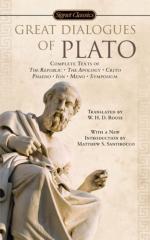
|
| Name: _________________________ | Period: ___________________ |
This test consists of 15 multiple choice questions and 5 short answer questions.
Multiple Choice Questions
1. Where is courage found in Socrates' republic?
(a) In the academics who strive for truth.
(b) In the soldiers who fight for it.
(c) In the labors who toil in the sun.
(d) In the lawyers and judges who fight injustice.
2. Who is the last person to leave the symposium?
(a) Socrates.
(b) Appolodorus.
(c) Diotima.
(d) Aristophenes.
3. According to Socrates, where would the republic's leaders live?
(a) Separately from the citizens.
(b) Among the citizens.
(c) In the Academy.
(d) In a palace in the country's largest city.
4. Toward the end of Book IV Socrates weaves an analogy between________________.
(a) Heaven and hell.
(b) The individual and the city.
(c) Father and son.
(d) The citizen and the king.
5. How does Dimotia characterize love?
(a) Beautiful and pure, like virtue or reason.
(b) Crude and deceitful, like the desire for immortality.
(c) Grounded and rational, like a mathematical equation.
(d) Curious and enigmatic, like the Gods.
6. In Socrates' republic, judges must__________.
(a) Be good, but able to spot evil.
(b) Be fair and lax.
(c) Be completely removed from evil.
(d) Be fair and strict.
7. According to Socrates' insinuation, artistic knowledge is characterized as which of the following?
(a) Universal.
(b) Useless.
(c) Subjective.
(d) Ironic.
8. Which of the following does Socrates reason about poetry?
(a) A poem's content cannot belong to the one who recites it.
(b) If poetry consists of statements which belong to other arts, then such "other arts" are actually one thing.
(c) Poetry was not meant to be read aloud.
(d) A poem's content always belongs to the one who recites it.
9. Socrates intends his imagined city to be taken as a symbolic model for__________.
(a) Justice personified.
(b) The individual soul.
(c) The natural animal kingdom.
(d) Collective consciousness.
10. What does Cephalus say to Socrates about old age?
(a) Old age is the same as youth, it just depends on one's perspective.
(b) Most people think it is a curse, but one can enjoy freedom from youth's passions.
(c) Aging takes the life out of one's body.
(d) Wisdom is not worth death.
11. How does Socrates rebut the definition of virtue offered by the poets?
(a) By showing Meno that all men desire good things, but that not all men are virtuous.
(b) By instructing Meno that it is impossible to have an abstract entity which moves other things but does not move itself.
(c) By giving Meno a solid definition of virtue.
(d) By proving to Meno that there are many commonly held virtues.
12. Socrates concludes which of the following about virtue?
(a) If it is the same in everyone, then we should be able to define it.
(b) It cannot be taught and is therefore not knowledge.
(c) If it can be taught then it is knowledge.
(d) If it manifests differently in different people, than it cannot have one definition.
13. How does Meno respond to Socrates' question: "Do bees differ as bees, because there are many different kinds of them; or, are they not rather to be distinguished by some other quality, as for example beauty, size, or shape?"
(a) "They're just bees. Who cares?"
(b) "I should answer that bees do not differ from one another, as bees."
(c) "I should say that bees must differ from one another, as bees."
(d) "I don't understand your question."
14. When first asked by Socrates to define virtue, Meno responds with which of the following?
(a) A theoretical ontology with ethical limitations on virtue.
(b) A question, asking Socrates if this is really worth his time.
(c) A vague unassuming definition which is accepted by Socrates.
(d) Examples of virtuous people with different lifestyles.
15. Who is Asclepius?
(a) A tyrant who reigns over his people.
(b) A philosopher who offers a competing argument.
(c) A doctor who gave simple and quick treatments to his patients.
(d) A ruler who looks kindly among his subjects.
Short Answer Questions
1. According to Socrates, the goal of his ideal city is__________________.
2. According to Socrates' view of justice, a ruler should always:
3. In Socrates' ideal city, poets and soothsayers:
4. In his first argument, Glaucon asserts that is better to __________.
5. What definition of virtue do Meno and Socrates borrow from "the poets"?
|
This section contains 784 words (approx. 3 pages at 300 words per page) |

|




